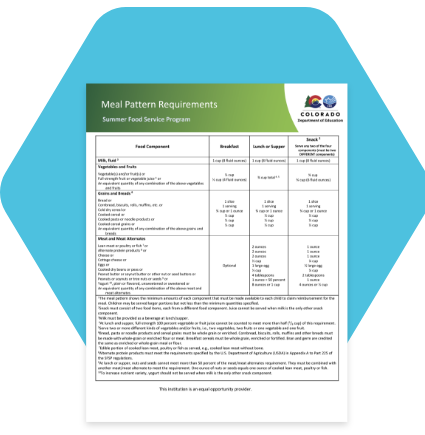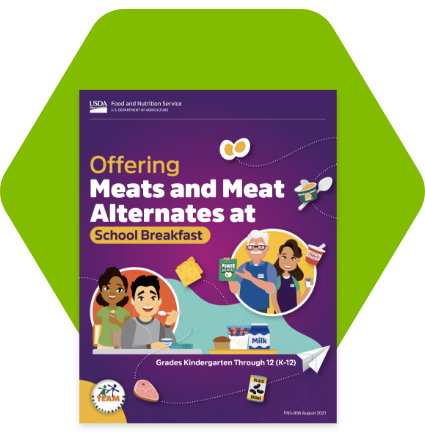You are here
Plan Meals

Sponsors of child nutrition programs are required to provide meals that meet the nutritional requirements of children and teens. Explore the resources below for information on the meal requirements for each program and menu planning resources.
Jump To:
Meal Patterns
Meal Pattern Timeline
USDA's Food and Nutrition Service (FNS) published the final rule titled, Child Nutrition Programs: Meal Patterns Consistent With the 2020-2025 Dietary Guidelines for Americans, which is the next step in continuing the science-based improvement of school meals. While this rulemaking is effective July 1, 2024, USDA is gradually phasing in required changes for added sugars and sodium as outlined in the table below.
Added Sugars (X indicates implementation date. Blank cells indicate no changes/no new requirements.
| Requirements | SY 2024-25 | SY 2025-26 | SY 2026-27 | SY 2027-28 |
|
Product-based limits for breakfast cereals, yogurt, and flavored milk (Cereal < 6 g per 1 oz, Yogurt < 12 g per 6 oz, Milk < 10 g per 8 oz) |
X | |||
| Weekly limit (<10% weekly calories from added sugars for both lunch and breakfast programs) | X |
Sodium
| Requirements | SY 2024-25 SY 2025-26 SY 2026-27 | SY 2027-28 |
|
Lunch - 15% reduction from current sodium limits:
|
Continue sodium target 1A from transitional final rule while working toward meeting future requirement. |
X
|
|
Breakfast - 10% reduction from current sodium limits:
|
Continue sodium target 1A from transitional final rule while working toward meeting future requirement. |
X
|
National School Lunch Program and School Breakfast Program Meal Pattern Requirements
National School Lunch Program and School Breakfast Program sponsors must plan menus to meet the meal pattern and dietary specification requirements for the grade groups served.
- 4 Day Lunch Meal Pattern: English, Spanish
- School Breakfast Program Meal Pattern: English, Spanish
- National School Lunch Program Meal Pattern: English, Spanish
- Vegetable Subgroups: English, Spanish
Pre-K Meal Pattern Requirements
School meal sponsors must plan menus to meet the pre-K meal pattern when serving pre-K students meals separately from older students.
- Preschool Informational Chart
- Grain-based Desserts
- Serving Meals to Preschoolers
- Yogurt Sugar Limit Worksheet
- Pre-K Lunch Meal Pattern: English, Spanish
Summer Food Service Program Meal Pattern Requirements
Summer Food Service Program sponsors plan meals that meet the nutritional and energy needs of kids and teens by following the SFSP meal pattern requirements.
View the Meal Pattern Comparison Chart to compare requirements across the child nutrition programs.

Documentation & Crediting
Program sponsors must maintain documentation to show how meals meet all program requirements.
Crediting Guides & Calculators
- Crediting Fruits and Vegetables: English
- Crediting Grains: English
- Crediting Meat/Meat Alternates: English
- Calculate the Components in a Recipe: English
- Calculate the Grain Component in a Recipe: English
- Exhibit A: Grain Requirements for Child Nutrition Program English, Spanish
- USDA Food Buying Guide: English

Production Records - National School Lunch Program and School Breakfast Program
Production Records - Summer Food Service Program
- SFSP Menu Production Record and Instructions: English & Spanish
- SFSP Delivery Receipt: English
Standardized Recipe
- Standardized Recipe Template and Example: English
Offer Versus Serve
Offer Versus Serve (OVS) allows students to decline some of the food offered in a reimbursable lunch or breakfast meal. OVS helps reduce food waste and allows students to choose the foods they want to eat.
National School Lunch Program and School Breakfast Program
Summer Food Service Program
Menu Planning & Recipe Resources
- Culinary training videos, resources, and recipes: The Culinary Institute of Child Nutrition
- Scratch cooking resources and recipes: The Lunch Box
- USDA Standardized Recipes: Child Nutrition Recipe Box
- Team Nutrition Posters, Recipes and Training Materials: Breakfast, Lunch
Special Dietary Needs
USDA’s non-discrimination regulation and the regulations governing the child nutrition programs mandate that substitutions to the regular meal must be made for children who are unable to eat meals because of their disabilities when that need is certified by a licensed healthcare professional.
Visit the Special Dietary Needs Online Training to learn more about accommodating special dietary needs.
Tools/Guidance & Resources
- Accommodating Children with Disabilities in the School Meal Program: English
- Standard Operating Procedure (SOP) Template for Special Diets: English
- Milk Substitution Flowchart: English
- USDA Non-Dairy Beverage Nutrient Requirements: English
- Food Allergy Booklet: What Employees Need to Know: English, Spanish
Questions? Identify Your Point of Contact


Connect With Us





